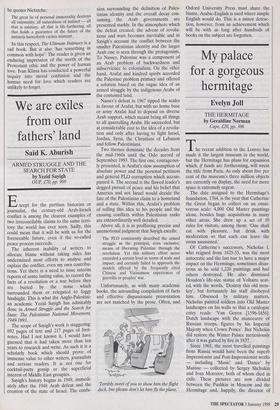We are exiles from our fathers' land
Said K. Aburish
ARMED STRUGGLE AND THE SEARCH FOR STATE by Yezid Sayigh OUP, f70, pp. 909 Except for the partisan historian or journalist, the century-old Arab-Israeli conflict is among the clearest examples of two irreconcilable claims to the same terri- tory the world has ever seen. Sadly, this could mean that it will be with us for the foreseeable future, even if the so-called peace process succeeds. The inherent inability of writers to allocate blame without taking sides has undermined most efforts to analyse and explain the conflict, even my own contribu- tions. Yet there is a need to issue interim reports of some lasting value, to record the facts of a revolution or a war before they are buried by the noise which surrounded them or relegated to foggy hindsight. This is what the Anglo-Palestini- an academic Yezid Sayigh has admirably done in Armed Stray:le and the Search for State: The Palestinian National Movement, 1949-1993.
The scope of Sayigh's work is staggering: 692 pages of text and 217 pages of foot- notes. Had I not known it, I would have guessed that it had taken more than ten years to research and write. As such it is a scholarly book which should prove of immense value to other writers, journalists and serious readers. It is not one for cocktail-party gossip or the superficial interest of Middle East groupies. Sayigh's history begins in 1949, immedi- ately after the 1948 Arab defeat and the creation of the state of Israel. The confu- sion surrounding the definition of Pales- tinian identity and the overall decay con- suming the Arab governments are presented starkly. In the atmosphere which the defeat created, the advent of revolu- tions and wars becomes inevitable and in Sayigh's account the conflict between the smaller Palestinian identity and the larger Arab one is seen through the protagonists. To Nasser, Palestine was a component of an Arab problem of backwardness and subservience to colonialism. On the other hand, Arafat and kindred spirits accorded the Palestine problem primacy and offered a solution based on the vague idea of an armed struggle by the indigenous Arabs of the contested land.
Nasser's defeat in 1967 tipped the scales in favour of Arafat, but with no home base or army Arafat had to depend on diverse Arab support, which meant being all things to all quarrelling Arabs. He succeeded, but at considerable cost to the idea of a revolu- tion and only after having to fight Israel, Jordan, Syria, the Christians of Lebanon and fellow Palestinians.
Two themes dominate the decades from the mid-1960s until the Oslo accord of September 1993. The first one, courageous- ly presented, is Arafat's slow assumption of absolute power and the personal pettiness and general PLO corruption which accom- panied it. The second is the flawed leader's dogged pursuit of peace and his belief that America and not Israel would decide the fate of the Palestinian claim to a homeland and a state. Within this, Arafat's problem of selling this idea to his people and the ensuing conflicts within Palestinian ranks are extraordinarily well detailed.
Above all, it is in proffering precise and unemotional judgment that Sayigh excells:
The PLO consistently described the armed struggle as the principal, even exclusive, means of liberating Palestine through the revolution. Yet this military effort never exceeded a certain level in terms of scale and impact, and certainly failed to approach the models offered by the frequently cited Chinese and Vietnamese experiences of guerrilla or peoples' war.
Unfortunately, as with many academic books, the astounding compilation of facts and effective dispassionate presentation are not matched by the prose. Often, and Tenib47 sweet of you to show him the flight deck, but please don't let him fly the plane.' Oxford University Press must share the blame, Arabic-English is used where simple English would do. This is a minor detrac- tion, however, from an achievement which will be with us long after hundreds of books on the subject are forgotten.


















































 Previous page
Previous page